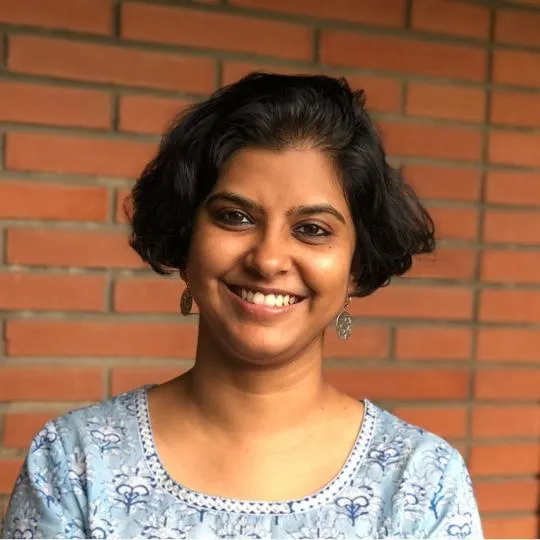
Dr Tarangini Sriraman
Wellcome Career Development Fellow
Research interests
- History
Contact details
Pronouns
She/her
Biography
Tarangini is a mid-career Wellcome Trust-funded Career Development Award Fellow. She is moving into this role on the heels of a previous grant award (Fellowship in the Medical Humanities and Social Sciences) also funded by the Wellcome Trust. Trained originally as a journalist, she has carried some of these narrative and investigative impulses into her training as a historian. She has robust interests in both the social history of medicine and socio-legal history in South Asia located in an expansive world of cross-cultural encounter. Her research interests have been shaped by her career teaching both history and politics courses in Delhi, Bangalore and London, and especially at Azim Premji University.
Research interests and PhD supervision
Tarangini's first book titled, In Pursuit of Proof: A History of Identification Documents in India published by OUP weaves together a novel history of making and verifying identification documents of subjects residing in the urban margins of Delhi such as refugees, slum residents, and rural migrants.
She is finishing her second manuscript that explores the role of caste and race stigma in shaping sociomedical conceptions of alcohol in twentieth century India. This book brings twentieth century (Telugu) vernacular health publics in conversation with nineteenth and twentieth century Anglo-American medical discourses of drinking.
Her new role at King's will see her work with a team of PDRAs in a more contemporary and abundantly familiar field of Covid-19 history. Her collaborative grant project entails mapping the politics of digital labour in pandemic volunteer sites such as online vaccination, health surveillance (contact tracing), and relief communication in India (as a primary site) and Indonesia (as a secondary site). Drawing on oral history and Digital Humanities methods, this grant project has two lines of inquiry, the politics of (unequal) health work in a digital sphere, and the politics of time in such work. As a team, they will be interested in inquiring into the ways in which volunteers shaped temporal conceptions of disease transmission, vaccine procurement, and urgent medical aid. She has published work resulting from and after her volunteer work with migrant workers during the Covid-19 lockdown years.
Teaching
Tarangini is interested in contributing to the teaching of a broad cross-section of History module offerings across historiographical methods, medical history, histories of migration, and South Asian history
Expertise and public engagement
Tarangini served as a volunteer over two years in the Stranded Workers Action Network (SWAN) which aided migrant workers along different axes of rations, travel, and other forms of relief during the pandemic. She has also served as a jury member of the People's Tribunal of Aadhaar. Her new grant role will see her work closely with several grassroots aid organizations, health organizations, digital rights, civil rights, and health activists in India.
Her work has appeared in several popular and policy-adjacent news forums such as The Wire, India Forum, The New Indian Express, The Print, and Buzzfeed.
She has also served as an external and internal reviewer for grants and selection processes of the ISRF and Future Leaders Fellowship (during her time at Goldsmiths). Tarangini is a member of the Editorial Board of Drugs, Habits and Social Policy
Selected publications
The power of the universal: Caste and missionary medical discourses of alcohol in the Telugu print sphere 1900-1940, Medical History, Open Access article, 67 (4), pp. 324-346,
‘Shifting Temperance Landscapes: Locating Caste and Gender within the Spatial Politics of Drink in Madras Presidency’, Social History of Alcohol and Drugs, 37 (1), 2023.
‘Affective Activism and Digital Archiving: Relief Work and Migrant Workers during the COVID Lockdown in India’, Political and Legal Anthropology Review, Open Access article, 45 (2), 2022, https://anthrosource.onlinelibrary.wiley.com/doi/10.1111/plar.12501.
‘Enumeration as “Pedagogic Process”: Gendered Encounters with Identity Documents in Delhi’s Urban Poor Spaces’, South Asia Multidisciplinary Academic Journal, 8, 2013 (http://samaj.revues.org/3655).
‘A Petition-like Application? Rhetoric and Rationing Documents in Wartime Delhi, 1941-45’ Indian Economic and Social History Review, 51 (3), 2014, pp.353-382.
‘Assault and Assuage: Identification Documents, Colonial Rationalities and Epidemic Control in British India’ in Nivedita Menon, Aditya Nigam and Sanjay Palshikar (eds.), Critical Studies in Politics: Exploring Sites, Selves, Power, Delhi: Orient Blackswan, 2013, pp. 271-318.
Special Article, ‘Revisiting Welfare: Ration Card Narratives in India’, Economic and Political Weekly, 46 (38), 2011, pp. 52-59.
In the media
- Interview with Suchitra Vijayan, Editor of Polis Project titled “Aadhaar can only deepen India’s socially embedded bureaucratic violence”, undated, The Polis Project, https://thepolisproject.com/aadhaar-can-only-deepen-indias-socially-embedded-bureaucratic-violence/
- Televised Interview with Siddharth Varadarajan, Founder-Editor of The Wire titled “Beyond Aadhaar: The History of Identification Documents in India” on September 5, 2018 https://www.youtube.com/watch?v=b1vBPgCp0a8
- Masterclass for One Nation, One Vote series curated by Hasgeek (story of uniqueness prior to biometric authentication), Prints in the sand of time
- National Centre for Biological Sciences Archives book talk, The NCBS Archives Public Lecture Series presents Tarangini Sriraman
- Podcast episode on plague in Bombay Presidency,
List of links for academic articles (in the same order as the list of publications)
Popular articles
- ‘Plague passport to detention: Epidemic Act was a Medical Surveillance Tool in British India’, https://theprint.in/opinion/plague-passport-to-detention-epidemic-act-was-a-medical-surveillance-tool-in-british-india/385121/
- ‘Bengaluru’s Shaheen Bagh: Muslim women and the religious route to the Constitution’ https://www.thenewsminute.com/article/bengaluru-s-shaheen-bagh-muslim-women-and-religious-route-constitution-116667 (also translated into Hindi)
- ‘Gender invisibility and women burning’, https://www.newindianexpress.com/magazine/2020/jan/26/gender-invisibility-and-women-burning-2093621.html
- ‘SC Judgement is an Exercise in Divorcing UID from the Concerns that were Raised’, The Wire, 28 September 2018, https://thewire.in/law/aadhaar-supreme-court-judgment
- ‘How Young Women in Indian Academia Feel about the List’, Co-authored article with Ishita Tiwary, Buzzfeed, November 22, 2017, https://www.buzzfeed.com/ishitatiwary/how-young-women-in-indian-academia-feel-about-the-list
- ‘Bus Porters’ Petition for Aadhaar: A Political Analysis’, February 22, 2015, http://kafila.org/2015/02/22/bus-porters-petition-for-aadhaar-a-political-analysis-tarangini-sriraman/
Publications in The New Indian Express
Research

The Digital Labour of Covid-19 Volunteerism: The Post-2000 Political History of Medical Infrastructures in India
This is a historical ethnography situating such labour within the post-2000 neoliberal landscape of digitisation in health and developmental landscapes in India
Project status: Ongoing

Centre for the History of Science, Technology and Medicine
Engaging directly with policy-makers to change understandings of history and of the world in which we live today.

Centre for Digital Culture
The Centre for Digital Culture at King’s College London is an interdisciplinary research centre promoting research and debate on digital culture
Events

Social Media and Cyber Security Space(s)
Digital Rights Activism Dialogues
Please note: this event has passed.
Research

The Digital Labour of Covid-19 Volunteerism: The Post-2000 Political History of Medical Infrastructures in India
This is a historical ethnography situating such labour within the post-2000 neoliberal landscape of digitisation in health and developmental landscapes in India
Project status: Ongoing

Centre for the History of Science, Technology and Medicine
Engaging directly with policy-makers to change understandings of history and of the world in which we live today.

Centre for Digital Culture
The Centre for Digital Culture at King’s College London is an interdisciplinary research centre promoting research and debate on digital culture
Events

Social Media and Cyber Security Space(s)
Digital Rights Activism Dialogues
Please note: this event has passed.
